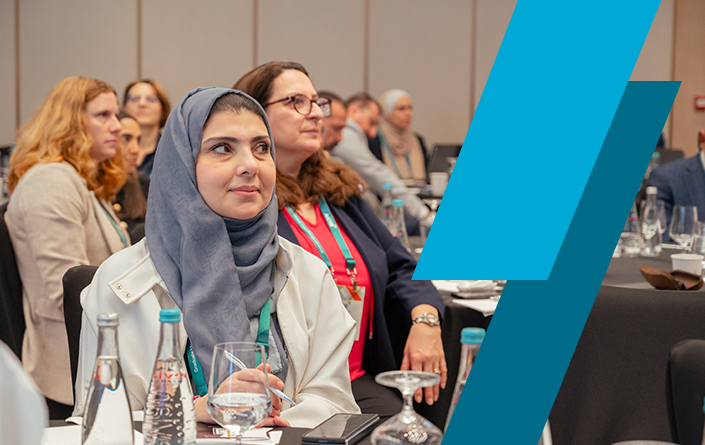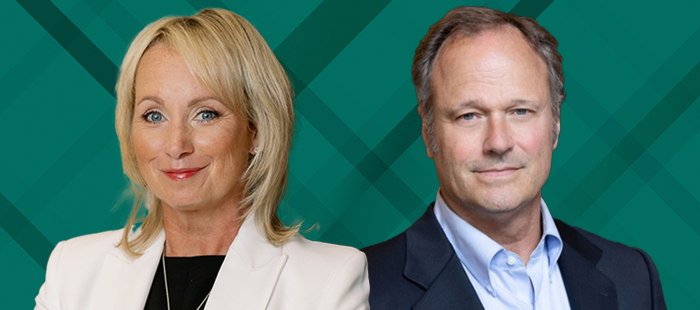Better Business in an Uncertain World
- AI, climate change, geopolitical turmoil, and new societal expectations have created an uncertain economic environment for business leaders.
- To navigate this world, leaders will need a combination of technical knowledge and emotional intelligence, as well as the ability to consider a range of new perspectives.
- Business schools can support leaders by breaking down disciplinary silos to foster a more creative approach to problem-solving.
Today’s business environment is shaped by major global issues such as climate change, accompanied by a mounting pressure for companies to adopt sustainable practices and make a positive societal impact. Over the last two years, we also have seen a rapidly shifting economic and geopolitical context. Equally rapid advances in artificial intelligence (AI) have prompted a more serious conversation about its safe use.
In this uncertain landscape, business leaders must cope with changed expectations about the role of business and even rethink how they define success for their organizations.
It’s our responsibility as business educators to help leaders develop the skills and sense of purpose they will need to chart a positive way forward. At King’s Business School at King’s College London, we have launched a new executive MBA program designed to do just that.
Changed World, More Complexity
Once, the interests of shareholders were the overriding concern of every business leader and guided every decision. Today, as the concept of the stakeholder economy becomes more established, businesses have permission to make choices that might not maximize shareholder return.
However, the job of the company leader has not become any easier. Questions that used to be quite simple have become complicated, and leaders need to unlearn what they once believed were the correct answers.
Resilience used to be primarily about protecting steady cash flow; now it’s about ensuring that an organization can adjust to physical, economic, and social shocks. Once, companies were only responsible for how they treated employees on their own payrolls. Now, businesses are judged and held accountable for employment practices across their supply chains.
In today’s uncertain landscape, business leaders must cope with changed expectations about the role of business and even rethink how they define success for their organizations.
Even the basis for a CEO’s remuneration has become more complex. In the past, the amount was probably based exclusively on a company’s financial performance. Today, for an estimated 75 percent of S&P 500 companies, the CEO’s compensation partly reflects how well the organization performs on environmental, social, and governance (ESG) criteria.
All these factors combine to make the current economic environment difficult for leaders to navigate.
New Knowledge, New Habits
At King’s Business School, we firmly believe that we can help executives negotiate the business world in a way that benefits both their companies and the wider society.
We know that ESG knowledge has become critical for business leaders, whether they are making day-to-day decisions, talking to investors, or seeking new forms of green capital. For that reason, we have infused sustainability in its broadest sense throughout our executive MBA program. A module on “innovation for impact” looks at how to embrace the opportunities of unmet consumer, social, and environmental needs. Another module specifically focuses on ESG and governance. Even courses that discuss human capital and diverse workforces include elements of sustainability.
Our EMBA also has been designed to foster key skills and intellectual habits that help leaders make better and more well-rounded decisions when they’re faced with difficult questions arising from the world’s big challenges. How fast can an organization decarbonize? How should it respond when there is global condemnation of the governments in countries where it operates? Can it help customers who are struggling in this financial climate?
One of the skills we focus on is the ability to distinguish between uncertainty and risk. Risk involves known probabilities and potential losses or gains. It can be likened to a roller coaster—it might be scary in places, but it is reasonably predictable and structured, with identifiable probabilities and potential outcomes. Business leaders are used to dealing with risk; they know how to analyze data and make calculated choices.
On the other hand, uncertainty arises from external circumstances, such as the eruption of a pandemic, the introduction of a novel technology, or a sudden and severe disruption to a supply chain. In these situations, it is difficult for leaders to make accurate predictions. To survive, they must show resilience and adaptability.
Understanding how to approach uncertainty is so important that we have made it a core module of our EMBA. In the module, students learn to deal with uncertainty through techniques such as statistical modeling, scenario planning, and war gaming. They also explore the psychology of uncertainty as they learn how they respond to it as individuals and whether their responses will enable them to manage the challenges they will face as leaders.
Purpose and Profit
When organizations are faced with uncertainty, a clear sense of purpose can be a guiding light. Leaders can sift through distractions and focus on the essentials once they understand how their enterprises contribute value both to customers and to society.
A sense of purpose enables leaders to answer the difficult questions posed by the big issues of climate change, geopolitical and economic instability, and technological disruption. It allows them to unite their colleagues and work toward common goals. It fosters integrity, a sense of belonging, and a belief that the organization is making a meaningful contribution to the world. A sense of purpose also can inspire individuals to pursue achievements and personal development.
When organizations are faced with uncertainty, a firm sense of purpose can be a guiding light. Leaders need to understand how their enterprises contribute value to society.
Understanding purpose and how to inspire it in others is as integral to leadership as understanding strategy and finance. Such an understanding goes hand-in-hand with certain other leadership skills, such as self-awareness, sensitivity to cultural context, and the ability to influence change.
At King’s Business School, we believe that a sense of purpose needs to be a consistent thread in both life and leadership, so we weave themes of ethics and values throughout our program. For instance, during their Global Immersion field trips, students engage with nonprofits and social enterprises. In their classrooms, they learn from individual case studies and examples that focus on ethical dilemmas and sustainability challenges. Our goal is to help leaders connect profit with purpose in their organizations so they can bring about change that is sustainable in every sense of the word.
Measures of Success
These are big ambitions and, to achieve them, we had to rethink some common assumptions in business education. Instead of teaching leaders to seek answers based on historical data and linear projections, we teach them to assess and consider a range of possible outcomes. We want them to acquire the habit of continuous learning and the skill of adaptability.
This means encouraging leaders to define success by different measures than “selling more product.” We expose them to companies like Vitsœ, which creates modular shelving that can be reconfigured and used throughout a customer’s lifetime. We also introduce them to Sojo, a clothing repair and alterations app that works with both retailers and consumers. Sojo was launched by a King’s College student and supported by the King’s20 Accelerator at our Entrepreneurship Institute.
Vitsœ and Sojo challenge traditional linear models of business by embracing the circular economy. By helping people reuse and repurpose what they already have, both companies also are succeeding by other measures. They are adapting to customers’ changing spending habits, and they are acting in ways that mitigate, rather than worsen, the effects of climate change.
There is huge potential in the circular economy. Experts estimate that, in London alone, efforts to implement a circular economy could generate 11 billion GBP (almost 14 billion USD). Some industry analysts predict that such efforts could total 24 billion GBP (more than 30 billion USD) by 2030.
The effects could be even more impressive on a global scale. A 2022 report from Goldman Sachs says that a circular economy could help add 4.5 trillion USD in additional economic output by 2030, and 25 trillion USD by 2050. Tomorrow’s leaders must understand how to embrace and leverage these alternative models to be successful by our new standards.
Interdisciplinary Approach
But to be successful in the current economic climate, businesses must look beyond sustainability and understand how to operate in a complex and interdependent world. That’s why, with our new EMBA, we wanted to challenge the way many businesses and business schools are organized.
Traditionally, companies are divided into departments such as finance, marketing, operations, and human resources, and each department prioritizes its own skills and methodologies. Most business schools have reflected these structures in their curricula. However, we feel that the challenges of the modern business landscape demand a more integrated and holistic approach to education that reflects the different perspectives leaders will hear when they gather executives around their meeting room tables.
Businesses must look beyond sustainability and understand how to operate in a complex and interdependent world.
Our goal is to encourage interdisciplinary learning and collaboration. We expose students to a broad range of subjects and encourage them to explore the connections between those subjects. We believe that when students understand the interaction between finance and sustainability, marketing and ethics, or human resource management and social responsibility, they will have a better basis for their decision-making when they’re leaders.
Several modules in our EMBA defy traditional disciplinary categories altogether. For instance, the ESG module is led by an entrepreneur with a PhD in economics. Its sessions cover topics such as climate science, disruptive thinking, and people management, and some of its guest speakers come from the worlds of finance and law. In this class, we want to equip leaders with an understanding of ESG reporting and the reasons it is so important; we also want to prepare them to lead their organizations to better performance in these spheres.
We extend our multidisciplinary connections beyond the business school. For example, participants in our EMBA program will learn strategy and leadership from experts in the war studies department, and they will gain the latest insights in regulation, compliance, and governance from professors in the law school. They will work on real projects that have been spun out from King’s health ecosystem, which will enable them to see how the latest technologies and solutions are affecting the healthcare market.
As they view challenges through radically different perspectives, students will be introduced to stimulating and exciting ideas, and they will learn to approach problems with greater creativity. Moreover, they will develop a systems-thinking mindset, which will lead them to consider the broader implications of their decisions on society, the environment, and other stakeholders.
An Uncertain World
Whether they are grappling with the use of AI in their organizations or trying to minimize their environmental impact while protecting jobs, tomorrow’s leaders will need to be adaptable, intellectually open-minded, and emotionally intelligent. They also will need to know how to bring together multidisciplinary perspectives to solve problems.
Leaders who have these characteristics will do a better job of shaping business in an uncertain world. Supporting them is one of the most important contributions that business schools can make to society.






